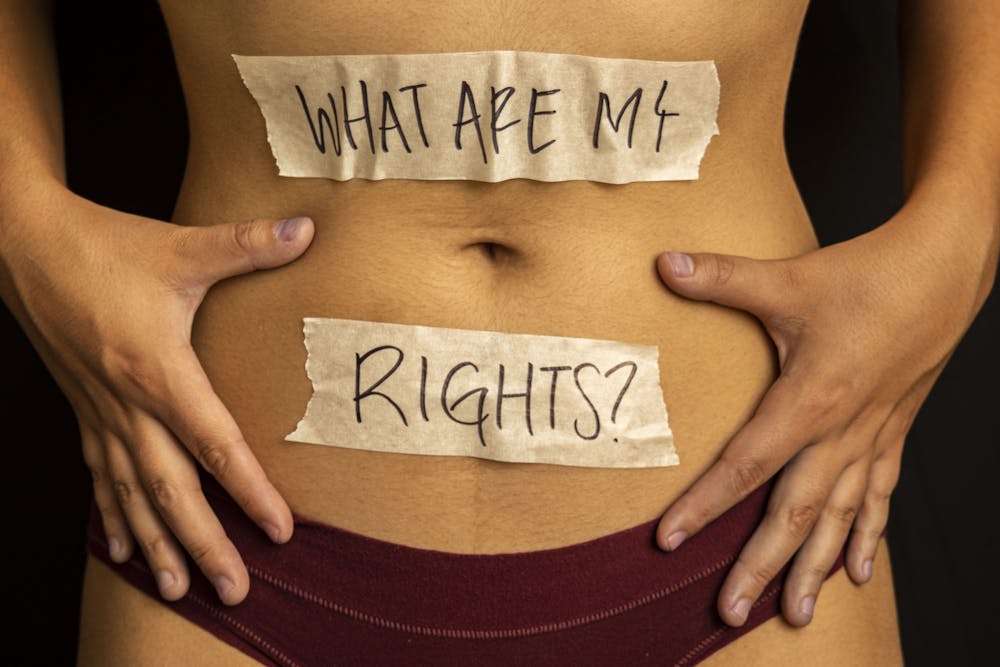More than two ideas
State versus national abortion policy debate continues, divides within sides of aisle

The debate between presidential candidates might make the conversation about abortion seem two sided: allow it, or don't. But for a lot of people, even within the same party, it's not that cut-and-dry.
Part of the debate is also whether to have a national policy, compared to state-by-state policies.
Vice President Kamala Harris said in the presidential debate on Sept. 10 that she would sign legislation into law to reinstate the guidelines of the Supreme Court Case Roe v. Wade that was overturned in 2022.
In turn, former President Donald Trump has taken credit for appointing three of the justices to the Supreme Court that ruled to overturn Roe with Dobbs v. Jackson Women’s Health Organization and thanked those justices for having the "courage" to do it.
But what do those cases mean? And what do people who aren’t politicians want for abortion regulations?
Roe, Dobbs and impact
The 1973 Roe v. Wade case was based on a woman’s challenge to a Texas law banning abortions, with only exceptions for the health of the mother.
According to Oyez, a project through Cornell Law School that summarizes and compiles Supreme Court cases, there was one central question to resolve: “Does the Constitution recognize a woman’s right to terminate her pregnancy by abortion?”
In this case, the justices ruled that it does, based on a right to privacy, but it depends on the trimester of the pregnancy.
- First trimester: The decision can only be made by the pregnant person and their doctor
- Second trimester: The state can impose regulations to protect the health of the pregnant person
- Third trimester: When the fetus can live outside the womb, states can regulate and/or prohibit abortions
That ruling was the standard for almost 50 years, until the 2022 case Dobbs v. Jackson Women's Health Organization came along.
The Dobbs case, according to Oyez, started with a law passed in Mississippi in 2018 that would ban abortions after 15 weeks. The key question to answer here:
“Is Mississippi’s law banning nearly all abortions after 15 weeks’ gestational age unconstitutional?” according to Oyez.
Here, the Supreme Court said yes, overruling the Roe decision and Planned Parenthood of Southeastern Pennsylvania v. Casey (1992) and effectively delegating the issue to be decided by individual states.
In the time since, the Guttmacher institute has documented (as of Oct. 16) 13 states that have put a total abortion ban in place and four more passed a ban after six weeks of pregnancy.
Guttmacher also recorded four states, including Michigan, that added abortion as a protected right in their constitutions. Here’s what Michigan's neighboring states have put in place:
- Wisconsin: Banned 20 weeks after fertilization with several legal restrictions
- Illinois: Only banned after fetal viability, with legal protections for privacy and insurance coverage
- Indiana: Completely banned with minimal exceptions
- Ohio: Constitutional protection, but some legal restrictions

To the states?
Erica Shekell is the communications director for Michigan Planned Parenthood Votes. She said having those inconsistencies between states can also make it harder for people in protected states to access health services.
“Having out-of-state people in Michigan not only delays abortion services, but other types of care,” Shekell said. “It really creates a domino effect having different states banning care.”
The effects are a higher barrier to entry, she said, where people who need an abortion have to save up money and vacation days to access it. In turn, that waiting forces people further along in their pregnancies, until they’ve violated their state’s time limit.
Shekell said having different states with different regulations creates a "confusing patchwork of laws." Instead, she said a national policy "like Michigan, but better" would be ideal.
That sentiment was echoed by Steven Alee, president of College Republicans at Central Michigan University. The national policies he and Shekell are interested in are different, but both expressed an interest in national regulations.
Within the Republican party, Alee said people have different approaches to the issue, with some in favor of the Dobbs decision and state decision making.
Alee said he, and other Republicans in the organization, would prefer a national policy to only permit abortions in cases of rape, incest or health risks to the pregnant person.
“We have to remember that the people on both sides of this issue aren’t coming from a bad place… we just have a different moral basis, which is hard to resolve,” Alee said.







